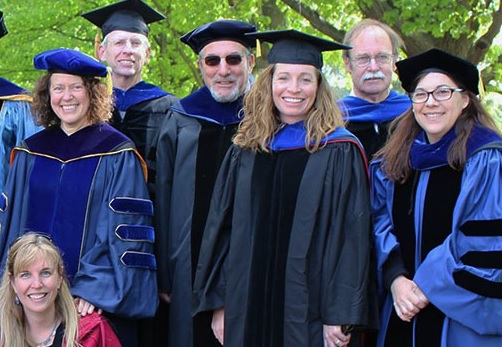
Faculty from the Department of Human Ecology, with left to right (standing) Cymie Payne, Heidi Hausermann (center) and Pamela McElwee (far right). All three are featured in this article.
Editor’s Note: This article originally appeared in the Fall 2016 edition of Explorations.
At the School of Environmental and Biological Sciences, faculty research often focuses on science’s most pressing questions. But in the Department of Human Ecology, these questions are further complicated and enhanced by an additional component: the human element. How do human populations affect the environment, and how do environmental changes impact local communities?
For three of the department’s researchers, these questions led them overseas, where underserved communities are often hit the hardest by environmental issues—and represented the least.

Pamela McElwee.
Ecosystems Services – Benefits people receive from nature.
Associate professor Pamela McElwee’s recent focus has been determining ways to value Vietnam’s natural resources, without demanding payment from communities that can’t afford it. In order to understand cultural nuances and develop and implement solutions, McElwee partnered with local authorities to perform workshops on how to value natural resources and also how to involve communities in solutions.

Heidi Hausermann.
Ghanaian Challenges — Industry and the implications for local community healthcare.
Assistant professor Heidi Hausermann has spent the last six years working in Ghana, and has three projects underway: The first examines the expansion of illegal gold mining that took place after 2008— how unregulated mining happens and what political relationships enable it—as well as the implications for local communities. The second involves examining local understanding and treatment of a necrotizing skin infection called buruli ulcer and access to treatment for locals; the third project is assessing the landscape and local health changes related to a new dam, completed in 2013.

Cymie Payne.
International Law — Protecting the environment
Attorney Cymie Payne, associate professor, is currently focused on informing policy in two areas: ocean issues of the high seas (anything beyond national jurisdiction, or about 200 miles offshore) and environmental protection during armed conflict.

